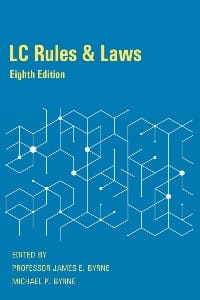This survey concentrates on the most significant letter of credit (“LC”)1 issues addressed in cases decided in the United States in the year 2021.2
• Windsor Township v. Tompkins Financial Corp. [2021]
• Shanghai Shipyard Co Ltd v. Reignwood International Investment (Group) Company Limited [2021]
• McNeil & NRM Inc. & SA Audi Bank France v. Kolon DACC Composite, Ltd. [2022]
• Vanpoy Corp. S.R.L. v. Soleil Chartered Bank [2019]
• Zions Bancorporation, N.A. v. JPMorgan Chase Bank, N.A. [2021]
• Puget Soundkeeper Alliance v. APM Terminals Tacoma LLC [2021]
• Viele v. Williams [2021]
• TC Skyward Aviation U.S., Inc. v. Deutsche Bank AG, New York Branch [2021]
• Lexon Insurance Co. v. FDIC [2021]
• Granite Re, Inc. v. National Credit Union Administration Board [2020]
• BNP Paribas, Singapore Branch v. Natixis, New York Branch [2020]
• ERA Capital L.P. v. Soleil Chartered Bank [2019]
• Lamda Solutions Corp. v. HSBC Bank USA, N.A. [2021]
• Solferini as Trustee of Corradi S.p.A. v. Corradi USA, Inc. [2021]
• In re Kimmel’s Coal & Packaging, Inc. [2021]
• In re Essar Steel [2021]
• Cassidy v. Signature Bank [2021]
• White Stag Aircraft Leasing U.S. LLC v. JP Morgan Chase Bank, N.A. [2021]
PRE-HONOR CASES
Pre-honor cases are those in which a dispute arises before a demand for payment under an LC has been honored.
WRONGFUL DISHONOR
Wrongful dishonor actions3 typically involve a beneficiary claiming wrongful dishonor by an LC issuer, and they focus on whether: (i) the claim asserted is within the scope of U.C.C. Article 5, (ii) the issuer gave timely and sufficient notice of dishonor4 and the discrepancies stated in that notice justify dishonor,5 (iii) there are extraordinary reasons requiring or permitting dishonor, such as forgery or material fraud,6 injunction, governmental laws, orders or sanctions, or insolvency,7 and (iv) the claimant’s action for wrongful dishonor is effectively and timely filed against the issuer (or confirmer).8 Others such as an advising or nominated bank may be liable for the failure of the LC transaction to result in issuance and honor. This survey discusses several cases that address the issuer’s, confirmer’s, and advising bank’s obligations and the remedies available against them separately from wrongful dishonor.
Wrongful dishonor disputes based on facial compliance or preclusion issues continue to be resolved mostly outside the courts. This is attributable to the clarity with which U.C.C. Article 5 recognizes standard LC practice in examining presentations and giving notice of dishonor, including international rules incorporated by reference into an LC, such as the ISP and UCP.9 Published ICC, BAFT,10 and IIBLP materials and programs also provide guidance on international standard banking practice of banks that regularly engage in letter of credit transactions.11

LC Rules & Laws
All the applicable international rules and laws for standbys, guarantees and trade in one place
In wrongful dishonor litigation applying U.C.C. Article 5, the parties and the court should address whether the issuer’s undertaking was an LC, whether timely presentation was made to the issuer, and whether the issuer gave timely notice of dishonor identifying each discrepancy. Assuming that the issuer has not precluded itself from raising any discrepancy defense, the parties and the court would then address whether the applicable LC compliance standard was or was not met, i.e., the “strict” compliance standard based on the observance of standard LC practice as stated in U.C.C. sections 5-108(a) and (e). Finally, they should address whether an action and the damages sought are within the scope of Article 5 and, if so, whether it is brought timely against a party under Article 5’s one-year statute of limitations for recoveries allowed by Article 5.
CHARACTERIZATION ISSUES—ARTICLE 5 VS. COMMON LAW
2021 included several reported opinions that treat the conditions, defenses, and limitations in Article 5 that should apply to claims against an issuer for wrongful dishonor as inapplicable or optional by allowing the beneficiary to proceed under breach of contract or other common law theories of recovery. In doing so, the opinions depart from the statutory goals of Article 5, starting with its intended treatment of an LC within its scope as “an idiosyncratic form of undertaking,”12 as well as overlook the well-established rule that where the U.C.C. has a specific provision that states an obligation and a remedy for breach, in many cases it displaces common law causes of action.13 We also discuss two international cases that deal with the question of characterizing a guarantee as an independent vs. suretyship undertaking.
LOST ORIGINAL
In Windsor Township v. Tompkins Financial Corp.,14 the court affirmed judgment on the pleadings in favor of the plaintiff who was required, but unable, to present the original LC to the defendant issuer. The Windsor Township opinion states at the outset that “[t]he instant case came before the Court as a complaint couched in breach of contract”15 and thereafter states “Vist’s objection to honoring the Letter of Credit is solely based on the fact that the Township never received or lost the original copy of the Letter.”16 The court stated that the issues in the case were not being decided under the U.C.C. and, because the parties agreed that an exact copy of the original LC had been presented to the issuer, the court relied on procedural law to support acceptance of the LC copy.17 To uphold its decision allowing presentation of a copy instead of the original of the letter of credit, the court did not apply U.C.C. section 5-108’s strict compliance standard, citing the 1978 opinion in Flagship Cruises,18 which applied a substantial compliance standard. That precedent and the substantial compliance standard that it applied were expressly rejected in the 1995 revision of Article 5.19 Authorities recognize that presentation of a copy instead of an original document called for by a letter of credit is a discrepancy justifying dishonor unless waived by the issuer.20
SURETYSHIP VS. INDEPENDENT UNDERTAKING
While not argued under Article 5 of the U.C.C. or the ISP, an English court and a French court each decided the issue of whether a guarantee was an independent undertaking or a suretyship obligation. The English case is Shanghai Shipyard Co Ltd v. Reignwood International Investment (Group) Company Limited,21 and the French case is McNeil & NRM Inc. & SA Audi Bank France v. Kolon DACC Composite, Ltd.22 If the undertaking is an independent obligation commonly known as a first demand guarantee or bank guarantee, the advantage to the beneficiary is that it need not prove that it is entitled to payment in order to obtain payment; the beneficiary’s timely documentary demand and, where called for or if the URDG23 governs the guarantee, presentation of a certification of default, is usually sufficient to entitle the beneficiary to payment. On the other hand, if the undertaking is determined to be a suretyship obligation or accessory guarantee, the guarantor can resist payment until after a court determines by proof that a default has occurred entitling the beneficiary to the amount demanded or drawn under the guarantee. That is the position the guarantors took in the Shanghai Shipyard and Audi Bank cases.
In the Shanghai Shipyard case, a $170 million long-term irrevocable and unconditional guarantee was issued by a non-bank entity to ensure payment for an oil drilling ship that took three years to construct. When it came time to pay the installment due at turnover of the constructed ship, the purchaser and guarantor refused to pay on the ground that the ship had serious defects and was not constructed according to specifications. The guarantee at issue read like a well-drafted corporate guarantee might read as commonly used in the United States, except that it provided that payment need not be made until an arbitration is resolved if arbitration is demanded. Further, the guarantor was the original purchaser of the ship but later became the guarantor when the purchase contract was transferred to a special purpose vehicle (“SPV”) established by the guarantor. The court declined to liken the guarantee of the SPV’s purchase obligation to a corporate guarantee or suretyship obligation. After discussions of and quoting the language of numerous English cases on the subject, the court determined that the guarantee was independent and that arbitration was not timely demanded so that the right to withhold payment on that basis was lost. The case has created uncertainty in English courts about the proper criteria to use to determine if a guarantee is independent.24
In McNeil & NRM Inc. & SA Audi Bank France v. Kolon DACC Composite, Ltd.,25 an advance payment guarantee was issued by a French bank to a Korean purchaser of sophisticated manufacturing equipment. When progress on the development and manufacture of the machinery ordered was delayed for extended periods of time, the Korean beneficiary requested the manufacturer–applicant to return its advance payment. When the manufacturer refused to do so, the beneficiary claimed under the bank guarantee. The applicant applied to the Paris Commercial Court to stop payment by arguing that the bank guarantee was not an independent guarantee used in international transactions but a contract of guarantee that is co-extensive with the principal contract so that payment should only be made after an arbitral award settling the contract dispute between the applicant and beneficiary, i.e., that a default was first proven. The bank guarantee issued by Bank Audi used wording indicating the intention of the bank to pay upon a proper demand for payment, i.e., before proof of default.26 The French court confirmed that the demand under the guarantee and its payment were only subject to the condition of a declaration by the beneficiary of a contractual default by the supplier.27 Payment was not conditioned on any other event of a contractual nature, including the materiality of the alleged breach of contract.
While distinguishing independent undertakings (LCs) from dependent undertakings (guarantees) has been a significant problem outside the United States, the 1995 revision of U.C.C. Article 5 greatly diminished the problem in the United States.28 The publication of Restatement (Third) of Suretyship & Guaranty contemporaneously with the promulgation of Article 5 of the U.C.C. recognized the effort to separate LC obligations from suretyship or accessory guarantee obligations.29













